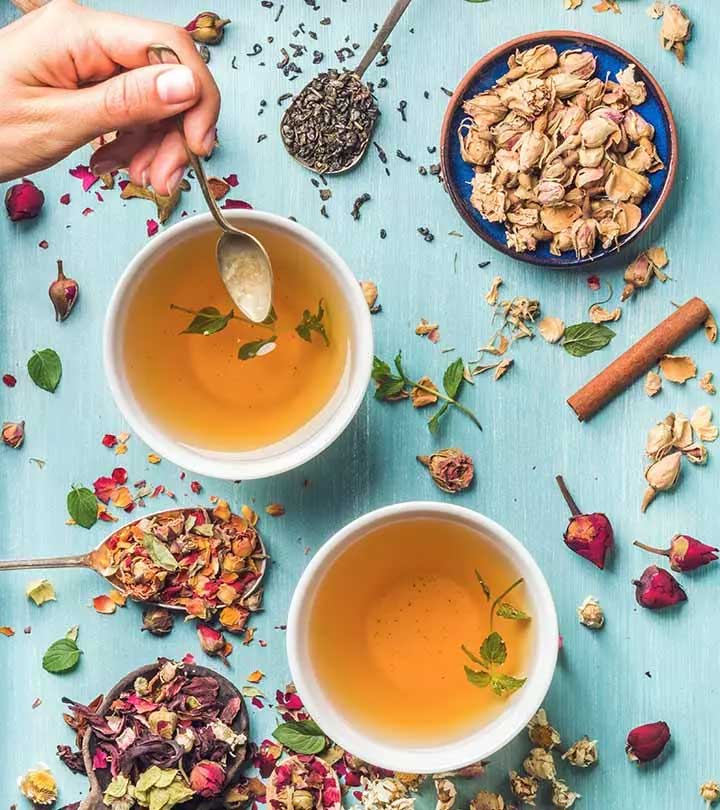Yellow tea is called huángchá in Chinese. It is one of the most luxurious and expensive teas available in the world. It has a delicious silky taste and a distinctive aroma – and was once a drink meant only for the royalty and the elite. But today, the tea is available the world over and is fast gaining popularity due to its wonderful health benefits.
Yellow tea comes from the processed leaves of the plant Camellia sinensis. Its process of preparation is similar to that of green tea – with an additional step of encasing and steaming the beverage. This results in a smoother taste than other teas.
The primary aim of making yellow tea is to remove the grassy smell of green tea while preserving the health properties. Yellow tea is available in different varieties, the most popular ones being:
- Junshan yinzhen
- Huoshan huangya
- Beigang maojian
- Da ye qing
- Haimagong cha
You can pick any of the varieties. All of these contain polyphenols and other important compounds that promote health by combating oxidative stress and enhancing antioxidant defense. Let’s look at the benefits in detail.
How Can Yellow Tea Benefit You?
The polyphenols in yellow tea fight oxidative stress and protect you from heart disease and cancer. Specific polyphenols can also promote improved blood sugar control and may help diabetes. These are the most important compounds of yellow tea – and they are the reason you should have it every day.
1. Promotes Heart Health
 |
| Shutterstock |
Polyphenols also exhibit anti-inflammatory properties that enhance heart health and prevent inflammation-related heart ailments (like coronary heart disease and myocardial infarction) (2).
Another important set of compounds in yellow tea are flavanols, which help lower bad cholesterol levels (3).
2. May Prevent Cancer
Yellow tea contains many bioactive compounds that contribute to its anticancer effects. These compounds fight oxidation and inflammation, thereby cutting down cancer risk (4).
The polyphenols in the tea can also exert protective effects against cancer (5). These compounds not only act as antioxidants but also positively influence various cellular mechanisms.
3. Aids Diabetes Treatment
Supplementing with yellow tea was found to ameliorate symptoms associated with type 2 diabetes (6).
Most of the beneficial effects of the tea can be attributed to its polyphenols. The major type of polyphenols in the tea are catechins – EGCG (epigallocatechin gallate) being the most important of them. This catechin was found to help combat obesity and metabolic syndrome in mice studies (7).
Polyphenols can also influence blood glucose levels and control (or even prevent) diabetes complications (8).
4. Promotes Digestive Health
Yellow tea polyphenols also play a role in treating many gastrointestinal issues. Some such ailments include inflammatory bowel disease, acute diarrhea, peptic ulcers, and cancers of the digestive tract (9).
Yellow tea antioxidants also help treat gastric injury caused by inflammation (10).
5. Can Aid Weight Loss
 |
| Shutterstock |
In another study, polyphenol intake was inversely associated with body weight and obesity in an elderly population. A greater polyphenol intake can reduce body weight and even cut down the risk of heart disease in the elderly (11).
6. Enhances Liver Health
Yellow tea might prevent the formation of fatty liver.
Research also shows that a polyphenol-rich diet can be considered a potential new approach for treating non-alcoholic fatty liver disease (12).
Rodent studies have revealed that polyphenols can reduce the metabolism of fat in the liver – thereby helping treat non-alcoholic fatty liver disease (13).
7. Helps Delay Aging
The polyphenols in yellow tea can offer benefits with respect to aging as well. Polyphenols derived from the leaves of the Camellia sinensis plant are believed to protect the human skin from the signs of photoaging (14). In many animal models, tea polyphenols were also found to inhibit UV-induced skin damage (14).
Other studies have also recognized the photoprotective properties of tea polyphenols – especially those coming from the leaves of Camellia sinensis (15).
The tea polyphenols also combat oxidative stress, which is another major contributor to skin aging (16).
Yellow tea is getting popular by the day. The reasons, as we discussed, are its benefits. Its high polyphenol content makes it a must-have. But, how do you prepare it?
How To Prepare Yellow Tea At Home
Brewing yellow tea is similar to that of most other teas. Make sure you use filtered water in the process.
What You Need
- A teapot
- A teacup
- 1 teaspoon of loose yellow tea leaves
- A kettle
Directions
- Warm the teacup and the teapot with some hot water. Swirl the water around and then discard from the containers.
- Add the tea leaves to the teapot. You may add a teaspoon of tea leaves for every 8 ounces of water.
- Heat water in the kettle until it touches 167oF to 176oF. Remember not to use boiling water – this may damage the flavor of the delicate leaves.
- Pour the hot water (along with the tea leaves) into the teapot and cover with the lid. Allow the tea leaves to steep for 2 to 3 minutes. You can taste the tea every 30 seconds to check if it has attained the desired flavor.
- Drain the tea through a strainer and pour it into the teacup. Enjoy!
You can use the same set of leaves 3 to 5 times before discarding them.
Conclusion
Yellow tea comes from the same family as green tea. But it is far milder, and you may enjoy the flavor more. That’s good news – as now, you can enjoy the benefits of the tea along with the rich, silky taste.
But be wary about supplements – some anecdotal evidence suggests that green tea/yellow tea dietary supplements may induce liver damage in some individuals. Please consult your healthcare provider before taking any supplements.
Did you have yellow tea before? How did you like it? Leave a comment in the box below and let us know your thoughts.
References
- “Polyphenols, inflammation, and cardiovascular…” Current Atherosclerosis Reports, US National Library of Medicine.
- “Tea and cardiovascular disease” Pharmacological Research, US National Library of Medicine.
- “Evidence for a protective effect of…” Therapeutic Advances in Chronic Disease, US National Library of Medicine.
- “Yellow tea, a promising Chinese tea…” Food Research International, US National Library of Medicine.
- “Tea and cancer chemoprevention: a…” Asian Pacific Journal of Cancer Prevention.
- “Dietary supplement of large yellow tea…” Nutrients, US National Library of Medicine.
- “Diet supplementation with green tea extract…” Nutrition & Metabolism, US National Library of Medicine.
- “Polyphenols and their effects on diabetes…” Medical Journal of the Islamic Republic of Iran, US National Library of Medicine.
- “Polyphenols and gastrointestinal diseases” Current Opinion on Gastroenterology, US National Library of Medicine.
- “In vivo antioxidative activity of yellow tea…” Spandidos Publications, Experimental and Therapeutic Medicine.
- “Polyphenol levels are inversely correlated with…” Nutrients, US National Library of Medicine.
- “Polyphenols treatment in patients with…” Journal of Translational Internal Medicine, US National Library of Medicine.
- “Green tea polyphenols ameliorate non-alcoholic…” World Journal of Gastroenterology, US National Library of Medicine.
- “Discovering the link between nutrition and skin aging” Dermatoendocrinology, US National Library of Medicine.
- “Protective mechanisms of green tea…” Oxidative Medicine and Cellular Longevity, US National Library of Medicine.
- “Polyphenols and aging” Current Aging Science, US National Library of Medicine.
Important Notice: This article was originally published at www.stylecraze.com by Ravi Teja Tadimalla where all credits are due. Reviewed By Registered Dietitian Nutritionist Rachelle Caves, RDN, CNSC, CPT.









